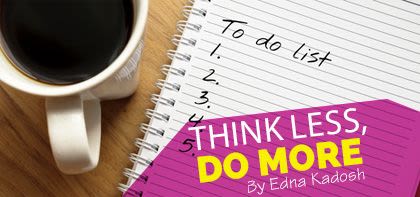
Think Less, Do More
Are we getting things done or are we just making excuses? Edna Kadosh, a certified trainer, gives us some tips for efficient time management…

Translated by Chana Cohen
Our surroundings are important to us. We love when the house is clean, organized, beautiful, aesthetically pleasing and well maintained. The few exceptions to the rule love the exact opposite – a dirty, neglected, crowded and unpleasant house.
This rule also applies to our bodies and our way of life – we like to be clean, organized, well-maintained, full of activity, flourishing and thriving. Some people live the opposite kind of life (and this isn’t just referring to the exceptions to the rule mentioned above, because obviously here we’re talking about many more people). They struggle with their weight, with negative emotions, or with sleep disorders. They feel frustrated and disconnected and suffer from all kinds of aches and pains, whether physical, emotional or spiritual.
As we all know the body houses the soul. And our soul is who we are – therefore our body is our house. The body is the part of us that actually does actions and accomplishes. Just like a person driving a car – the person chooses the destination and the car brings him there. All he needs to do is fill the gas tank, let Waze calculate the route and he can be on his way.
The Hebrew word Torah comes from the root word “hora’ah” which means to teach. The Torah provides us with amazing advice and wonderful recommendations on how to live the life we have been given. When we received the Torah on that momentous occasion at Mount Sinai, the entire nation declared as one, “Na’aseh V’Nishma – We will do and we will listen.”
Here is where the question comes up. Why did we say “we will do”, before we said “we will hear”? 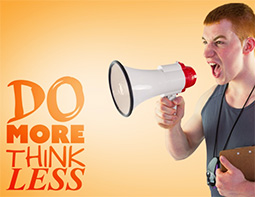 Doesn’t it make more sense to say we will do after we hear and understand? That’s how we usually do things.
Doesn’t it make more sense to say we will do after we hear and understand? That’s how we usually do things.
There is actually an amazing piece of advice for us here.
There are many situations in life where we must do something. We have to accustom ourselves to doing and only afterwards hearing and understanding. Why? Because after the action is done we can then have a better understanding.
One reason why we should start with action is to create a habit of paying attention and focusing.
Why?
Because there is an important rule which is that whatever we focus on and pay attention to will grow and flourish.
Let’s take an example of someone who is longing for companionship. He tells himself, “I don’t want to be alone anymore, I hate being lonely and it’s so hard for me.” Thoughts like these only serve to intensify his loneliness and make him unhappier. On the other hand, doing a small action to start his search for a friend or spouse, together with prayer, will help him greatly. An added bonus is that he won’t feel lonely anymore because now he’s doing something to help get him to his destination, to accomplish his goal. And that alone will strengthen him and give him a good feeling about himself.
Here’s another example. Suppose a person wants peace and quiet in his life. If he thinks to himself, “Everyone at home/ in the office really pushes all of my buttons and makes me so angry!” that will only intensify his anger and disquiet.
What happens when we give our attention and focus to things like success in business, finding friendship, and improving our health through doing positive actions?
You know the answer to that one.
There’s another way to explain this concept. What’s the difference between decisions and habits? If we make decisions, then why do we need habits? Because decisions are theoretical. We don’t necessarily implement all of our decisions right away. But habits are another story. They are the implementation of the decision, of the things we have taken upon ourselves to do, the actions that allow us to live in harmony between how we chose to behave and how we behave in reality. Habits are derived from actions. They bring us to a certain way of life. After we have already experienced something, we can then learn about it and maybe even come to a better understanding.
The importance of action is that we are taking responsibility and paying attention to an act behind which is an idea, ideology and theory. One who says ‘I will do’ receives faith in himself and the satisfaction and pleasure that comes from doing. He releases doubts that have accumulated within him and by virtue of that will hear better. Anyone who says ‘I’ll try, I’ll try,’ is basically just saying ‘no’ in a nice way and is therefore accompanied by a sense of doubt and mistrust in himself.
We can see from here that doing is an important foundation that affects hearing and understanding.
Someone who wants to learn and understand more and more, and won’t act upon anything until he knows the entire Torah, won’t do anything. He puts himself in a situation where he will always be learning and never doing because there will always be more depths to delve into. Therefore, he loses belief in his own abilities and he won’t be doing anything. He will always be stuck in the same place.
Here are three steps you can take to make sure you are doing and accomplishing from the very beginning: Planning, Testing and Monitoring.
A person who decides to be a fitness trainer should start learning and practicing and not sit in his armchair until he has studied anatomy, physiology and various sports. By following the three steps mentioned above he will achieve great results.
A person who wants to lose weight or improve his health must learn the principles and immediately implement them. Only action will bring him to form good habits and only by doing will he recognize what is good for him and what strengthens him. If he invests only in “hearing” and learning more and more, he will never succeed in applying what he knows and getting to a stage where he is “doing”. The “hearing” helps a person learn a lot, but if he does not apply what he learns to his life he will end up whining about his fate for days or even years. He is always thinking but never doing.
But if one is constantly doing, he will always be cognizant of the next rule: I’m not a complainer, I’m a champion!
Why? Because experience and action fill in what theory lacks. That can be the reason why many expert, skilled and sensitive professionals have started with action from the very beginning and then progressed more and more with every step they took.
Think less, do more! Do actions and then listen and learn, for the understanding is always better after the experience.
* * *
Edna Kadosh – Intensive Care Nurse, multidisciplinary complementary medicine therapist. She gives training and support utilizing Eastern, Western and Hasidic influences. She also teaches numerotherapy. She has authored the book, “49 ימי מסע“. To order the book or to schedule a workshop, call 050-5574065. She can be contacted at ednakadosh18@gmail.com or on Facebook at – מידה טובה – הקוד להרזיה בריאה or visit her website – http://www.ednakadosh.com/





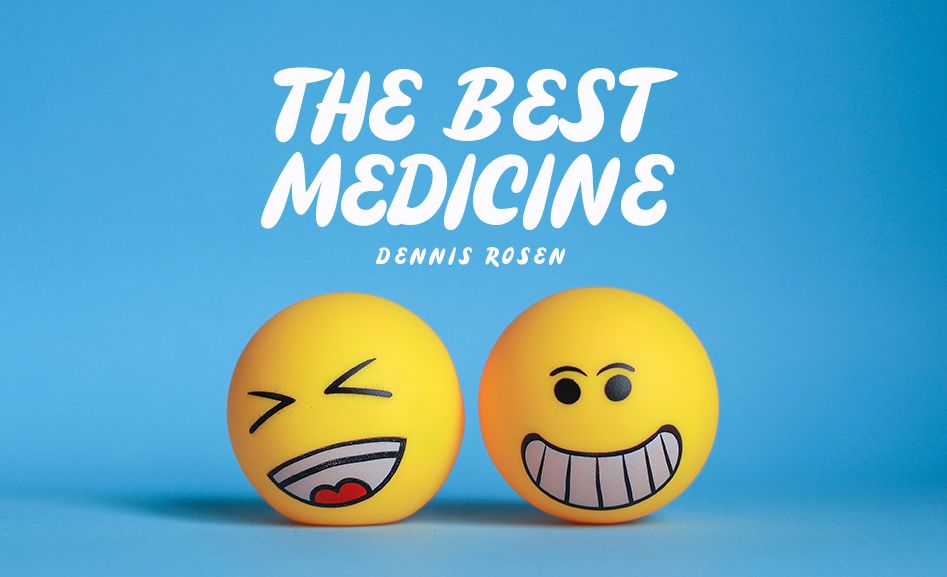

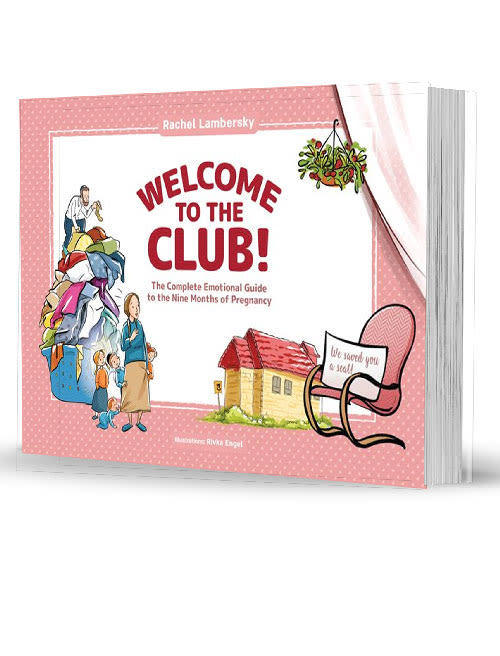
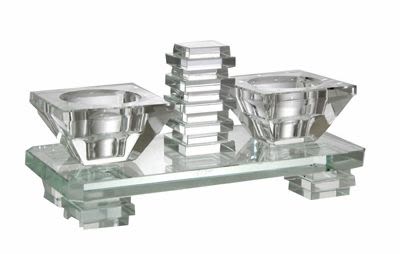
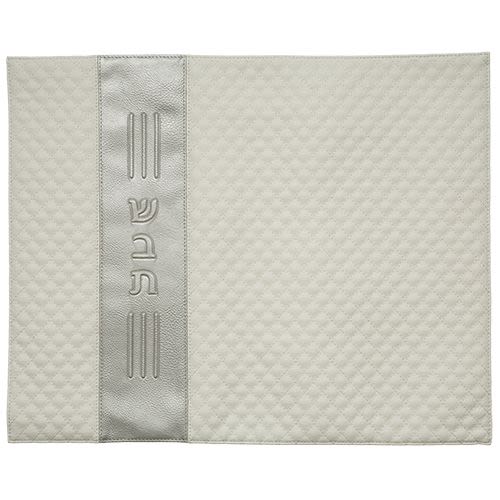


Tell us what you think!
Thank you for your comment!
It will be published after approval by the Editor.